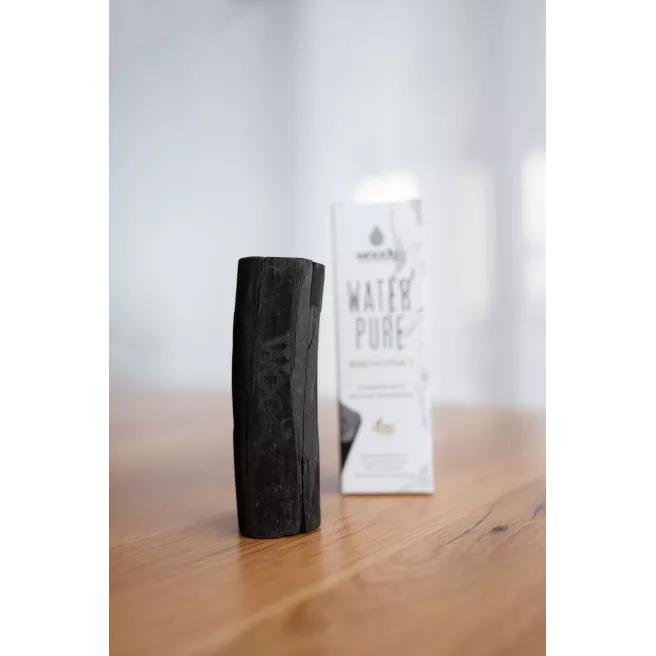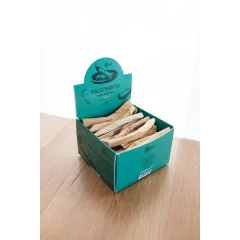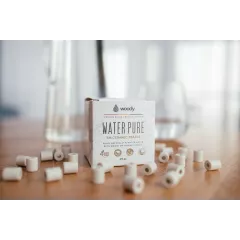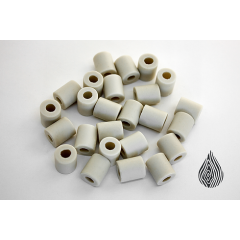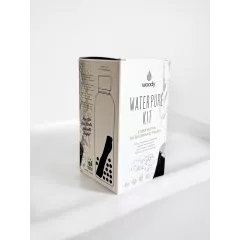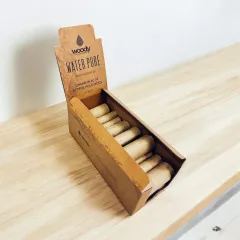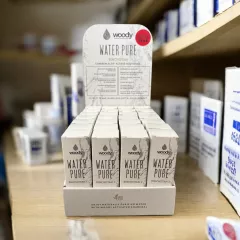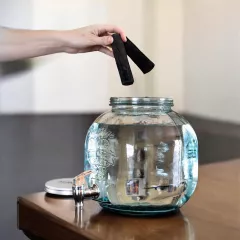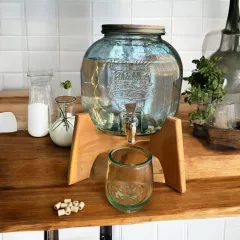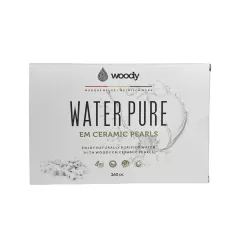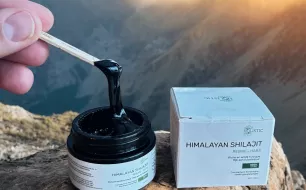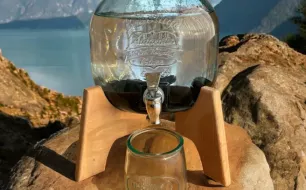Product successfully added to your shopping cart
1 Active Charcoal Woody Binchotan Woody Binchotan 1 Piece
8,90 € tax incl.
Only 150,00 € left to get free shipping
- Fast delivery
- Secure payment
- A team at your service
- Free delivery on orders over 150€
WBIN1
Discover the Woody Binchotan 1 Piece, a premium activated charcoal made in Indonesia by Widha, a recognized master burner. Using the rare wood of Pelawan (Tristaniopsis obovata), this charcoal ensures exceptional water purification, ideal for pure and tasty tap water. Perfect for those in search of a natural and sustainable solution.
Data sheet
| Length | 3.94 inches |
| Width | 2-4cm |
| Weight | +_80g |
| Origin | Indonesia |
More info
Woody's Binchotan Activated Charcoal
Transform every glass of tap water into a pure and delicious drink with Woody's Binchotan activated charcoal water filter. Binchotan activated charcoal has been recognized for centuries for its exceptional water purification properties. Made from wood branches, burned at high temperature (1200°C) then quickly cooled, it offers an ideal porous structure for removing impurities and contaminants.
Main Features:
- Handcrafted Manufacturing: Each piece is meticulously crafted by Widha, ensuring optimal quality through traditional techniques.
- Material: Using Pelawan wood (Tristaniopsis Obovata), this charcoal benefits from increased density that maximizes filtration efficiency, offering superior absorption of impurities.
- Origin: Produced in Indonesia, it benefits from high quality materials and ancestral know-how, guaranteeing natural and efficient purification.
Advantages:
- Increased Efficiency: Thanks to the exceptional density of Pelawan wood, Woody Binchotan surpasses traditional charcoals in terms of purification. It absorbs toxins, contaminants and impurities, while improving the taste and smell of water.
- Durability: Usable for about 6 months, each piece can be regenerated by boiling, extending its lifespan and reducing waste.
- Eco-friendly: By choosing Binchotan, you opt for a sustainable and biodegradable solution, reducing the use of disposable plastics.
Why choose binchotan activated charcoal?
Efficient and Natural Purification Binchotan activated charcoal purifies water by adsorption, capturing impurities on its porous surface. It effectively removes chlorine, heavy metals and chemicals, while alkalizing water and releasing beneficial minerals such as calcium and magnesium.
Improved Taste and Smell Say goodbye to the unpleasant taste and smell of tap water. Binchotan improves the quality of your water, making it more enjoyable to drink.
Economical and Durable Use an activated charcoal stick for 6 months, thus reducing your expenses in costly water filters and plastic bottles.
A Gesture for the Planet By opting for activated charcoal, you reduce your consumption of single-use plastic, thus contributing to the preservation of the environment.
Health Benefits Enriched with essential minerals like calcium, magnesium and iron, your water becomes healthier and beneficial for your body.
What activated charcoal removes from your water
- Chlorine: Reduces the rate, taste and odor of chlorine.
- Heavy Metals: Adsorbs lead, mercury and copper.
- Chemicals: Removes pesticides, herbicides and other chemicals.
- Organic Impurities: Retains unwanted organic matter.
- Micro-plastics: Captures micro-plastics for cleaner water.
Recycle activated charcoal after 6 months
Don't throw away your binchotan stick after use! Here are some ideas for recycling it:
- Natural Deodorant: Place it in your shoes, refrigerator or cabinets.
- Moisture Absorber: Ideal in damp spaces.
- Plant Fertilization: Break it into small pieces and add it to your soil.
- Composting: Enrich your compost to improve water retention.
Why a Binchotan Activated Charcoal that Floats in Water is of Poor Quality?
A good quality binchotan activated charcoal is dense and naturally sinks to the bottom of the water. If the stick floats, this may indicate lower quality manufacturing, with an insufficient porous structure to ensure effective adsorption of impurities. Poor quality binchotan will have reduced performance in terms of water purification, thus compromising the expected benefits. Always choose authentic and high-quality binchotan for optimal water purification.
Steps for Using and Recycling a Binchotan Activated Charcoal
Usage Steps
- Initial Preparation
- Rinsing: Rinse the Binchotan charcoal under running water to remove dust and residues.
- Activation and Sterilization: Boil the charcoal for about 10 minutes to activate and sterilize it.
Daily Use
- Placement: Place the binchotan charcoal in a carafe, a bottle, or a water container. Use a Woody binchotan charcoal for 1.5 liters of water.
- Purification: Allow the charcoal to act for at least 6 to 8 hours (ideally overnight) to purify the water.
- Maintenance: Rinse the charcoal every 2 to 4 weeks and boil it for 10 minutes to regenerate and maintain its effectiveness.
Lifespan
- Continuous Use: A binchotan charcoal can be used for about 6 months before needing a replacement.
- End of Life: When the charcoal begins to lose its effectiveness (the water is no longer as purified), it's time to recycle it.
- Lifespan Filtering capacity: Each stick of charcoal purifies up to 1.5 litres of water and you can alternate up to 3 cycles of 8 hours per charcoal per day; just put your purified water in another container after 8 hours and put water on the charcoal for another filtration cycle and so on. So you can filter up to 4.5 liters of water per day and per charcoals and this for 6 months for a maximum total of 810 liters.
Recycling Steps
1. Deodorant: Use the old Binchotan charcoal to absorb odors in the refrigerator, shoes, or closets.
2. Moisture Absorbent: Place the charcoal in humid places to absorb excess moisture.
3. Fertilizer for Plants: Crush the old charcoal and mix it with the potting soil to improve the soil quality and water retention.
4. Composting: Add the used binchotan charcoal to the compost. It improves aeration and the structure of the compost, promoting faster decomposition.
Discover the exceptional properties of Tristaniopsis Obovata for the manufacture of high-quality binchotan activated charcoal
The Tristaniopsis obovata, or Pelawan, stands out not only for its high density and durability, but also for its unique properties that make it an ideal material for the manufacture of high-quality activated charcoal.
Why is Tristaniopsis Obovata ideal for activated charcoal?
1. High Density: Tristaniopsis obovata has a density ranging from 800 to 1,000 kg/m³. This high density means that the wood is very compact, with low natural porosity. This allows for the creation of activated charcoal with a highly developed micro-porous structure. Offering an exceptional adsorption surface to capture impurities and contaminants. 2. Durability and Resistance: Thanks to its natural resistance to termites and other decomposing agents, activated carbon made from Tristaniopsis obovata is particularly durable. This durability results in increased longevity of activated carbon filters, thus reducing the frequency of replacement and associated costs. 3. Purity of Material: The wood of Tristaniopsis obovata is naturally pure and does not contain any undesirable additives or chemical residues. When transformed into activated carbon, it provides a water filtration solution that does not release harmful substances, ensuring safe and effective water purification. 4. Microporous Structure: The process of manufacturing activated carbon from Tristaniopsis obovata, involving high-temperature combustion followed by rapid cooling, creates an ideal micro-porous structure. These micro-pores increase the surface available for adsorbing contaminants like PFAS, chlorine, heavy metals, and volatile organic compounds (VOCs), making the drinking water purer and healthier. Concrete Advantages of Activated Carbon in Tristaniopsis Obovata - Filtration Efficiency: Elimination of up to 90% of PFAS and other contaminants. - Improvement of Water Quality: Alkalinization of water and release of beneficial minerals. - Environmental Durability: Reduction of plastic consumption thanks to natural and durable filtration. For more information on Tristaniopsis obovata and its applications, consult the following sources: - NVBT - Sea Tristania or Pelawan - National Parks Board - Tristaniopsis obovata Comparison of the density of Tristaniopsis Obovata with other tropical and non-tropical woods Tristaniopsis obovata: Density: 800 to 1,000 kg/m³ Oak: Density: 750 to 900 kg/m³ Maple: Density: About 700 to 750 kg/m³ Teak: Density: About 600 to 750 kg/m³ Bamboo: Density: 350 to 650 kg/m³ Eucalyptus: Density: 600 to 900 kg/m³ Protect your health with Woody's Binchotan Activated Carbon Dangers of PFAS Pollution Per- and Polyfluoroalkyl Substances (PFAS) are synthetic chemicals commonly used for their anti-adhesive and water- and grease-resistant properties. Their persistence in the environment and their ability to accumulate in living organisms pose serious dangers: For Human Health: - Endocrine Problems: PFAS disrupt the hormonal system, causing reproductive and developmental disorders. - Risk of Cancer: Exposure to certain PFAS is linked to an increased risk of liver, kidney, and testicular cancers. - Weakening of the Immune System: PFAS can decrease the immune response, making the body more vulnerable to infections and vaccines. - High Cholesterol: They increase the level of blood cholesterol, a risk factor for cardiovascular diseases. For the Environment: - Persistent Contamination: PFAS are extremely resistant to degradation, persisting in soils and waters for decades. - Bioaccumulation: They accumulate in the tissues of living organisms, disrupting food chains and affecting wildlife and flora. Extent of PFAS Pollution in Europe PFAS pollution is a growing concern in Europe. These substances have been detected in groundwater, surface water, and even drinking water. The European Union is taking measures to limit PFAS levels in drinking water and reduce existing contamination. Effectiveness of Activated Carbon Filtration against PFAS Activated carbon is a proven solution for reducing PFAS in drinking water. Advantages of Binchotan Activated Carbon: Advanced Porous Structure: Superior Adsorption Capacity: The Binchotan Woody, made from dense wood, has a micro-porous structure that effectively adsorbs contaminants, including PFAS. Proven Performance: Scientific Studies: Research shows that activated carbon filters can remove up to 90% of PFAS from drinking water. The exact effectiveness depends on the size of the PFAS molecules, the type of activated carbon used, and the filtration conditions. Why Choose Woody's Binchotan Activated Carbon? Woody's Binchotan Activated Carbon offers effective and natural purification of your water. With PFAS removal rates reaching 90%, it ensures purer and healthier water for you and your family. By choosing this filter, you are choosing an environmentally friendly solution that reduces your plastic footprint while improving the quality of your water. Do not let PFAS threaten your health and that of your loved ones. Adopt Woody's Binchotan Activated Carbon today and make the choice of pure and tasty water.
Download
WATER TEST BEFORE
Water test conducted before filtration through activated charcoal on tap water
Download (328.87k)WATER TEST AFTER
Water test conducted after using an active Woody Binchotan charcoal for 8 hours
Download (329.14k)Certificate of carbon rate
90% minimum carbon rate to be able to call this a binchotan activated charcoal
Download (479.1k)Reviews
You must log in to give a review
